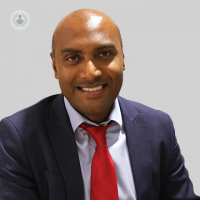Breast surgery: what can go wrong?
Written by:Breast augmentation remains an ever-popular plastic surgery option for those who are unhappy with the cosmetic appearance of their breasts, as well as a way of restoring a more a natural appearance to those who have lost parts of their breasts to injury or illness, such as breast cancer. However, it is important to make an informed decision before any surgery. Your surgeon should take you through exactly what can go wrong and what the odds are of needing revision surgery later. Experienced surgeon Seni Mylvaganam explains the risks of breast surgery.

What are the risks of breast augmentation surgery?
The key risks that any surgeon should inform their patients about are:
- Implant loss/infection rates – any surgeon should be able to give you their rate in this instance, and this is the risk that the implant may need to be removed within the first three months after surgery. This should be less than 1%.
- Capsular contracture – this is a complication as result of the body’s immune response to the implant. In all patients with implants, a capsule, which can be thought of as a sheet of cling-film is produced around the implant by the body. However, capsular contracture refers to a thickening of that capsule, which can misshape the implant and cause pain. Modern day implants should have a capsular contracture rate of less than 10% at 10 years. A significant capsular contracture would require surgery to remove the capsule and replace the implant.
- Anaplastic large cell lymphoma – this is a type of lymphoma that appears to be associated with the capsule surrounding breast implants. It is a disease which the medical community is still learning more about, but it is very rare. Currently, the risk is 1 in 300,000 ladies with implants developing it and usually, if it does occur, it is contained within the capsule, so surgery to remove the capsule would be curative.
How often is breast augmentation revision surgery required?
Revision surgery can be undertaken either because of recognised complications, or because of the patient’s choice.
As regards the patient’s choice, it is crucial that prior to your augmentation surgery, your surgeon understands what you hope to achieve from a shape and body perspective after augmentation and that they are able to explain what techniques they will employ to achieve that goal. Also, they should inform you where that goal may not be attainable. This agreement of expectation and any limitations that will have an effect on the final cosmetic outcome if discussed thoroughly beforehand, in my experience gives the highest rate of patient satisfaction and minimises patient requests for revision.
Otherwise, revision surgery may be required because of the commonest complications: implant rupture, capsular contracture, rippling of the implant, or drooping of the overlying skin. These complications are not common and should they occur, discussion with your surgeon as to the best strategy moving forward is vital. It is also important to understand that cosmetic breast surgery changes the appearance of a woman’s breasts at a particular point in time. What is beyond the control of surgical techniques is the natural change of breast tissue and overlying skin with physiological changes such as ageing, pregnancy and breast feeding. This can affect the breast appearance over time, with some women choosing revisional surgery to address these changes.


